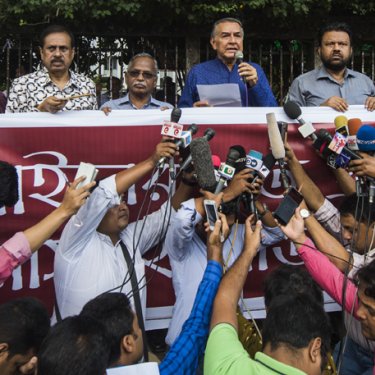RSF backs Bangladeshi media protest against digital security law

Reporters Without Borders (RSF) supports the strong show of opposition to Bangladesh’s new digital security law from the editors of the country’s leading newspapers, who are pressing for immediate changes.
In an unprecedented demonstration of unanimity, the editors of 16 Bangladeshi newspapers formed a human chain outside the National Press Club in Dhaka yesterday to demand amendments to nine of the articles in the Digital Security Act that was enacted last week.
Daily Star editor Mahfuz Anam said the “Sampadak Parishad” (Editors’ Council) is calling for the law’s most draconian sections to be rewritten during the next session of parliament to ensure that they do not override the provisions of the Right to Information Act.
“We fully support the Bangladeshi journalists combatting a law whose provisions as regards press freedom are utterly absurd,” said Daniel Bastard, the head of RSF’s Asia-Pacific desk.
“What with suppressing the confidentiality of sources, banning coverage of public officials and ambiguous wording, the Digital Security Act in its present form poses major threats to press freedom, one of the cornerstones of Bangladeshi democracy. With two months to go to a general election, we urge parliamentarians to ensure that amending this law is one of the election campaign’s central issues.”
Draconian provisions
As soon as the proposed law was unveiled in January, RSF warned the authorities about its deep flaws and urged them to scrap the most draconian provisions.
One of its most bizarre articles made “spreading negative propaganda against the Father of the Nation” punishable by 14 years in prison and/or a fine of 5 million taka (50,000 euros). The “Father of the Nation,” Sheikh Mujibur Rahman, was also the father of Sheikh Hasina, who has been prime minister for the past ten years.
The Digital Security Act was intended to replace the notorious and controversial section 57 of the Information and Communication Technology (ICT) Act, which the government has used to silence dissent.
Its latest victim is Shahidul Alam, a well-known photojournalist who has been languishing in prison since 5 August for posting a video on Facebook showing the scale of the student protests taking place in Dhaka at the time, during which journalists were attacked by pro-government activists.
Bangladesh is ranked 146th out of 180 countries in RSF’s 2018 World Press Freedom Index.



